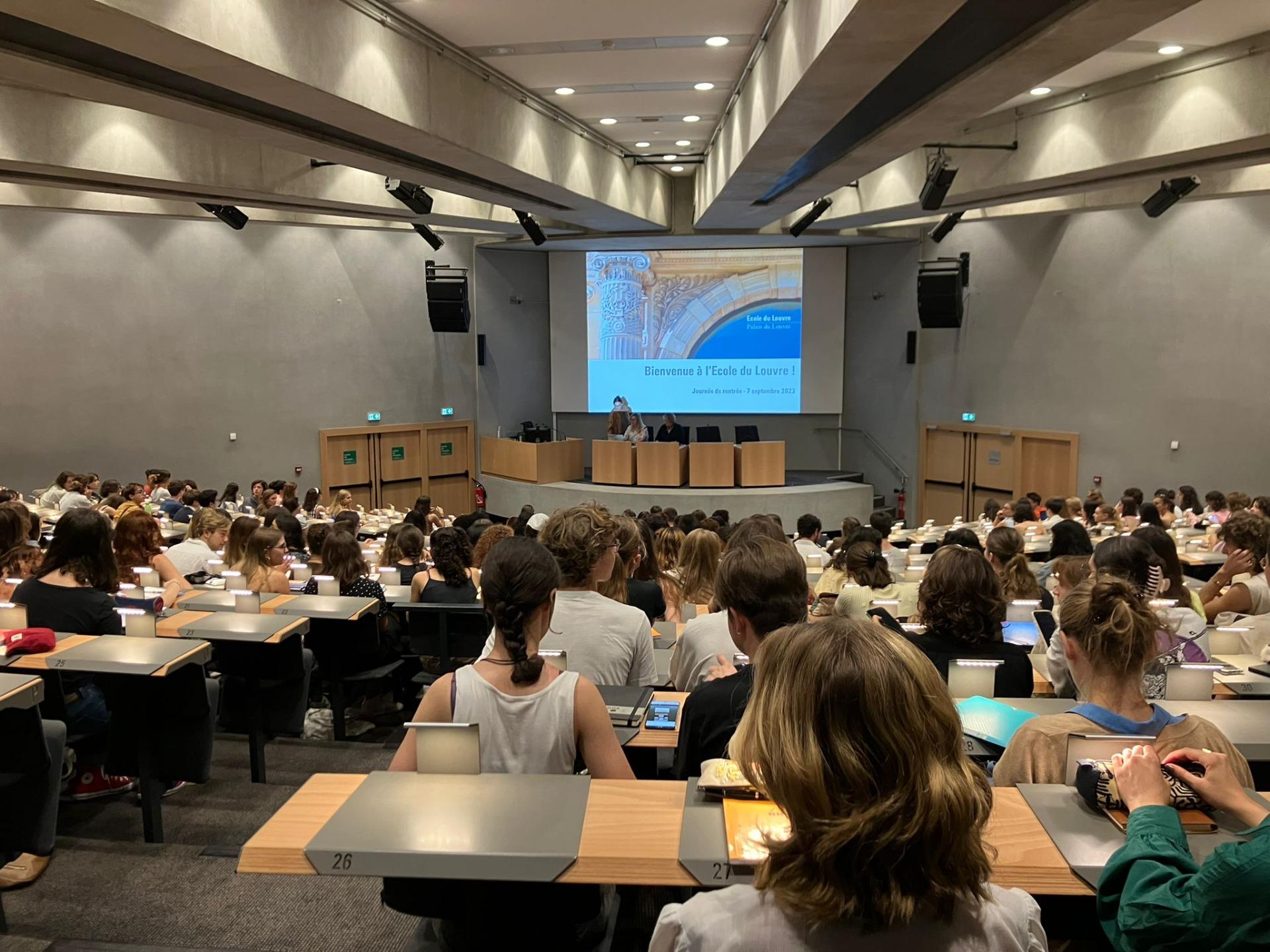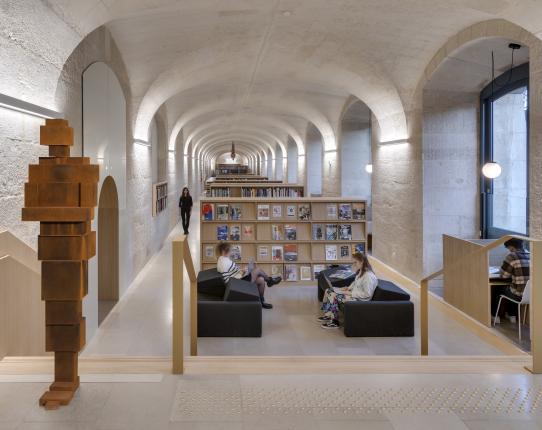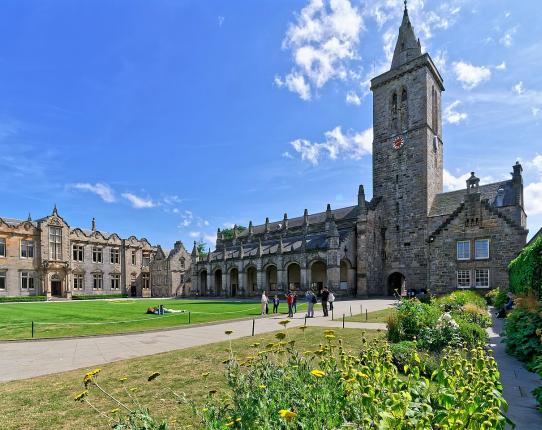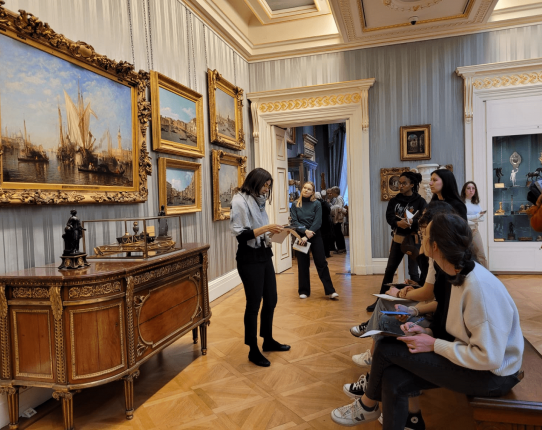
Partnerships
Introduction
Students at the Ecole du Louvre can opt for multiple partnerships, including two double diplomas, semesters or years abroad (Erasmus + programme), doctoral co-supervision with French or international universities, as well as numerous other teaching partnerships.
National partnerships
In collaboration with the Conseil des maisons de vente, the Ecole du Louvre offers four weeks of theoretical and practical classes for each of the two years of work experience which need to be completed before taking the entrance exam to the auctioneer profession.
This course, composed each year of three weeks of classes and a week of study travel, allows students to deepen their knowledge of art history, in areas of creation which are little covered during a traditional course but often illustrated in the auction room. The lectures given at the Ecole du Louvre are followed by practical work in small groups in different museums, galleries or cultural establishments.
- Admission conditions
This course is exclusively for auctioneer interns after they passed the entrance exam for the internship which takes place every year in September.
- Informations and contact
Phone : 01.53.45.85.45
What Ecole du Louvre students get
- Teaching modules
Students from the second year of the second cycle, who attend the “research” course in art history applied to collections can attend a seminar to choose from a list of courses offered by the ENC. Students must follow the Master 2 seminars on the schedule sent by the education service.
- Registration conditions
Students choose the seminar they want to attend during education registration at the Ecole du Louvre, then must register with the ENC secretariat.
- Assessment
To grade the seminar, students must comply with the requirements set out by the seminar leader.
This seminar counts as an external seminar of semester 3 (compulsory as part of the course of the second year of the second cycle in “Research in art history applied to collections” and is and worth 6 ECTS credits.)
What Ecole nationale des chartes students get
- Teaching modules
A first-cycle general history of art class ( in 1st, 2nd or 3rd year) and a specialising first-cycle course (organic course only)
- Registration conditions
Students of the Ecole des chartes register for the start of the September school year with the EDL’s first-cycle education centre. They receive a partner student card which allows them access to the Ecole du Louvre, the library and also various museums.
- Assessment
No Assessment
What Ecole du Louvre students get
- Teaching modules
Students in the second year of the second cycle studying the “research” course and ENSBA post-graduate students can access the «La vie tumultueuse des œuvres d’art contemporain» seminar.
- Registration conditions
Students choose the seminar during their education registrations at the Ecole du Louvre. ENSBA students register with their secretariat.
- Assessment
Students must comply with the requirements set out by the seminar manager who will be grading them throughout the school year.
This seminar counts, for the Ecole du Louvre, as a 3rd trimester seminar (compulsory as part of the second year of the second cycle “Research” course and and worth 6 ECTS credits.)
What the Ecole nationale des Beaux-Arts de Paris students get
- Teaching modules
Third-year students: a first-cycle specialising course (organic course only)
Fifth-yea students: a joint ENSBA/EDL seminar entitled “La critique d’art”
- Registration conditions
ENSBA students register for the start of the September school year with the EDL first-cycle education centre. They receive a partner student card which allows them access to the Ecole du Louvre, the library and also various museums.
- Assessment
Students should get more information from the ENSBA education service.
What Ecole du Louvre students get
- Teaching modules
Second year students of the second cycle “research” course in art history applied to collections can choose a seminar from a list of courses offered by the ENS. Students commit to following the Master 2 seminars on the schedule sent by the education service.
- Registration conditions
Students choose the seminar during their education registration at the Ecole du Louvre, then must register with the ENC secretariat.
-
Assessment
To validate a Master 2 seminar, students must comply with the requirements set out by the seminar leader.
This seminar counts, for the Ecole du Louvre, as a 3rd term external seminar (compulsory as part of the curriculum of the second year of the second cycle “Research in art history applied to collections” and worth 6 ECTS credits.)
What Ecole Normale Superieure de Paris students get
- Teaching modules
Either a Master 1 teaching unit (1st semester) among the following:
- History of collections, museums and heritage in Europe;
- Administration and management of heritage and museums;
- Principles of conservation-restoration;
- Introduction to mediation and audiences;
- Museology, history and foundations;
- Historiography
Or an organic first-cycle specialising course
- Registration conditions
Access to an EDL course or an ENS seminar is subject to:
a) the written agreement given to the student by the course team of their home establishment or by the head of this team.
b) acceptance of the student based on the reception capacities of the partner establishment.
ENS students register for the start of the September school year with the EDL first-cycle education centre. They receive a partner student card which allows them access to the Ecole du Louvre, the library and also various museums.
- Assessment
Written exam on the teaching unit (January) for the second-cycle seminar.
Three-hour final exam for the first-cycle course.
A specific agreement allows ENS students who passed the ENSPSL entrance exams and are admitted to the Art department to enter the third year of first cycle. (contact: [email protected])
What Ecole du Louvre students get
- Teaching modules
For students in the second year of the second cycle "research" course in art history applied to collections, a master’s seminar of their choice within the offering of the IVth section (Historical and philological sciences) of the Ecole pratique des hautes Etudes. Students commit to follow the seminars on the schedule provided by the education service.
- Registration conditions
Students choose their seminar as part of their education registration at the Ecole du Louvre, then must register with the EPHE secretariat.
- Assessment
To validate a seminar, students must comply with the requirements set out by the seminar manager who will be grading students throughout the school year.
This seminar counts as an external seminar of semester 3 (compulsory as part of the course of the second year of the second cycle “Research in art history applied to collections” and worth 6 ECTS credits.)
What Ecole du Louvre students get
- Teaching modules
First or second cycle students get a seminar or specialising language course or scientific communication or epigraphic documentation.
- Registration conditions
Students choose their seminar as part of their education registration at the Ecole du Louvre, then must register with the EPHE secretariat.
- Assessment
To validate a seminar, students must comply with the requirements set out by the seminar manager who will be grading students throughout the school year.
[email protected]
What second-cycle students of the Ecole pratique des hautes études get
- Teaching modules
- A second year of the second cycle seminar that can be chosen from the “research” courses in art history applied to collections or in museology, semester 3 (except methodology seminar and external seminars).
OR
- An organic specialising first-cycle course of your choice and a first-year level supervised practical course, or an epigraphy course (this first-cycle course is from October to April).
- Registration conditions
At the start of the September school year, students register for a module of their choice among those offered by the partnership, either with the second cycle education centre (second cycle seminar), or with that of the first cycle (organic course and supervised practical work or epigraphy course).
They receive a partner student card which allows them access to the Ecole du Louvre, the library and also various museums where part of the lessons can take place.
Registration for modules is no longer possible if a third of the sessions have already taken place.
- Assessment
To validate a second year of the second cycle seminar, partner students must comply with the requirements set out by the seminar manager who will be grading students throughout the school year.
To validate an organic first cycle course, students take a three-hour final exam. The practical work course is assessed through throughout the year.
Ecole du Louvre students get
- Teaching modules
A seminar is part of the education of students in the second year of the second cycle of the Ecole du Louvre and in the initial training of conservative students of the INP. It offers an approach to the sustainable development process applied to heritage. Its ambition is to draw up an inventory of practices and theoretical approaches in the field.
- Registration conditions
Students choose the seminar at the time of their education registration.
- Assessment
Students must comply with the requirements set out by the seminar manager who assesses them throughout the school year.
What INP student restorers get
- Teaching modules
An introductory evening course on general art history (from September to July). - Registration conditions
Registration for the course is done with the education service of the Ecole du Louvre, with the first cycle education centre. Students receive a partner student card which allows them access to the Ecole du Louvre, the library and also to various museums. - Assessment
No assessment. Only class attendance is taken into account.
Ecole du Louvre students get
- Teaching modules
First-year and second-year, second-cycle students attending the “research” course get one of the seminars organised by the research and teaching department of the Quai Branly museum.
- Registration conditions
Students choose their seminar as part of their education registrations at the Ecole du Louvre
- Assessment
To validate a course module, students must comply with the requirements set out by the seminar leader.
The chosen seminar counts as an external semester 3 seminar (compulsory as part of the curriculum of the second year of the second cycle "research" course in art history applied to collections or in museology) and worth 6 ECTS credits.
Ecole du Louvre students get
- Teaching modules
Open to second year second cycle students course. A seminar which covers art history and social and political history around five themes focused mainly on Versailles, and more generally on the places and expressions of monarchical power.
- Registration conditions
Registration upon selection following submission of an application file.
- Assessment
To validate a seminar, students must comply with the requirements set out by the seminar manager who will be grading students throughout the school year.
- Teaching modules
For second-year of the second cycle students attending the “research” course in art history applied to collections, an “Art and society” seminar is offered by SciencesPo.
- Registration conditions
Students choose their seminar as part of their education registration at the Ecole du Louvre.
- Assessment
To validate this seminar, students must comply with the requirements set out by the seminar leader.
This seminar counts as an external seminar of semester 3 (compulsory as part of the course of the second year of the second cycle “Research in art history applied to collections” and worth 6 ECTS credits.)
A double degree exists between the Ecole du Louvre and Science Po.
Ecole du Louvre students get
- Teaching modules
It is offered to first-year second cycle students to choose in the ESSEC Grande Ecole programme (in the third term):
- A course replacing the complementary seminar of S2
- Three courses replacing the two main seminars and the complementary seminar of S2.
- Registration conditions
Students wishing to follow the course exchange programme with ESSEC must complete an application form during the month of October. Criteria taken into account in the selection:
- Motivation,
- Concordance between the interests expressed by the candidate with their work or current research,
- Initial training and academic level.
- Assessment
Each course is subject to an attendance check and an examination according to the study regime in force in the host establishment. Validation will result in the allocation of credits corresponding to the programme followed.
What ESSEC students get (MSc programme)
- Teaching modules
ESSEC students registered in the MSc programme can take three courses or seminars from the second-cycle programme of the Ecole du Louvre (with the exception of research groups, museography, methodology seminars and seminars from partner establishments).
In addition to these courses, students follow a group of supervised practical work (TDO) (10 sessions of 2 hours) which is also offered to the Ecole du Louvre’s external students.
- Registration conditions
ESSEC students interested in this programme must first – during the Bachelor year – have completed the prerequisite year (Introduction to Art History course of the Rachel Boyer foundation). They must then tell the ESSEC national partnerships manager they wish to apply.
- Assessment
Students are subject to the assessment methods and rules in force at the Ecole du Louvre, including the obligation of attendance. Their results are communicated by the education service at ESSEC.
A double degree exists between the Ecole du Louvre and Essec.
Ecole du Louvre students get
- Teaching modules
- First-cycle students get a Latin epigraphy course (license degree course, 1 level only) offered by the university.
- Second-year students in the “research in art history applied to collections” second-cycle course get a seminar offered as part of the master’s degree in archaeology at Paris 1 Pantheon-Sorbonne.
- Registration conditions
For the epigraphy course, students register with the Ecole du Louvre’s education centre, then at the UFR secretariat. They must be enrolled in a specialising archaeology course. Second-cycle students make their choice during their education registration.
- Assessment
To validate the epigraphy course, students must comply with the university's examination procedures. This seminar counts, for the Ecole du Louvre, as an optional complementary course.
To validate the master’s seminar, students must comply with the requirements set out by the seminar leader.
What university students get
- Teaching modules
Students at the Paris 1 university at master’s level attending the “History and Anthropology of Antiquity (Assyriology)” course get a course in Sumerian epigraphy from the Ecole du Louvre.
- Registration conditions
Students register at the start of the September school year with the university, then with the first-cycle education centre of the Ecole du Louvre.
They receive a partner student card which allows them access to the Ecole du Louvre, the library and also various museums.
- Assessment
To validate the course, partner students must comply with the requirements set out by the course manager who will be grading students throughout the school year.
Ecole du Louvre students get
-
Teaching modules
First-year second-cycle students at the Ecole du Louvre can follow one of the following seminars within the "Letters, languages, human and social sciences" masters’ degree, with the "Studies English speakers" specialisation from Denis Diderot University, Paris
- "Introduction to the history of painting in Great Britain"
- "Introduction to the history of images in the United States"
- "Art and society in Great Britain: history artistic institutions”
- “Gender and image practice in the United States” -
Registration conditions
Students choose their seminar as part of their education registration at the Ecole du Louvre, then must register with the university secretariat. - Assessment
To validate a masters’ seminar, students must comply with the requirements set out by the seminar manager who will be grading students throughout the school year.
The seminar taken counts as a complementary semester 2 seminar, and worth 3 ECTS credits in the model of the first year of the second cycle (note, the seminar can take place during semester 1).
What Paris-Cite students get
-
Teaching modules
Students at Paris-Diderot university attending the master’s degree in "Letters, languages, human and social sciences", with "English-speaking studies" specialisation get
- a course module from the first semester of the first year of the second cycle: either “History of art, diachronic subject” or “History of collections and museums in Europe”
- or an organic first cycle course of choice and corresponding practical work at first year level (from October to April ). -
Registration conditions
Students register at the start of the September school year with the first cycle education centre for a module of their choice from those offered by the partnership.
They receive a partner student card which allows them access to the Ecole du Louvre, the library and various museums. - Assessment
To validate a first-year second-cycle seminar, partner students must take a final exam in January.
To validate an organic first-cycle course, students are subject to a final exam in May. The practical work course is assessed throughout the year.
Ecole du Louvre students get
-
Teaching modules
Second-year, second-cycle students in the “research in art history applied to collections” course get one seminar among the fundamental seminars of Master 1 and Master 2 in the History of Art and Archaeology specialisation. -
Registration conditions
Students choose their seminar as part of their education registration at the Ecole du Louvre, then must register with the university secretariat. -
Assessment
To validate a Master 2 seminar, students must comply with the requirements set out by the seminar manager who will be grading students throughout the school year.
This seminar counts, for the Ecole du Louvre, as an external seminar of semester 3 (compulsory as part of the curriculum of the second year of the second cycle “Research” in the history of art applied to collections” and worth 6 ECTS credits.)
What Paris-Nanterre University students get
-
Teaching modules
“Art History and Archaeology” Master 2 students get a second-year seminar of the second cycle’s “research” course in art history applied to collections (except methodological seminar and external seminar). -
Registration conditions
Students register at the start of the September school year with the second-cycle education centre for a module of their choice from those offered by the partnership.
They receive a partner student card which allows them access to the Ecole du Louvre, the library and also to various museums where part of the lessons can take place.
Registration for modules is no longer possible if a third of the sessions have already taken place. - Assessment
To validate a second year of the second cycle seminar, partner students must comply with the requirements set out by the seminar manager who will be grading students throughout the school year.
In collaboration with the Rodin Museum and the C2RMF, the Ecole du Louvre is participating in the “History of Art and Preparation for Restoration” degree course at the Paris Nanterre University. It aims to give students the lessons necessary to prepare for competitions for heritage restorers.
Contact : [email protected]
Find out more : https://prepa-concours-restaurateur.fr/
Ecole du Louvre students get
- Teaching modules
Second-year, second-cycle students in the "research" course in art history applied to collections get a seminar in the master’s "Art History and Archaeology" research programme. - Registration conditions
Students choose their seminar as part of their education registration at the Ecole du Louvre, then must register with the university secretariat. - Assessment
To validate a Master 2 seminar, students must comply with the requirements set out by the seminar manager who will be grading students throughout the school year.
This seminar counts as an external seminar of semester 3 (compulsory as part of the course of the second year of the second cycle “Research in art history applied to collections” and worth 6 ECTS credits.)
What Sorbonne University students get
- Teaching modules
- “History of art and archaeology” Master 1 students get an organic course of choice and a corresponding practical work course at first-year level or an epigraphy course (October to April).
- “History of art and archaeology” Master 2 students get an organic course of choice and corresponding practical work at first-year level or an epigraphy course (October to April) or a second-year seminar of the second cycle’s “research” course in art history applied to collections (except methodological seminar and external seminars). - Registration conditions
Students register at the start of the September school year for a module of their choice among those offered by the partnership, either with the second-cycle education centre (Master 2 seminar), or with the first-cycle education centre (organic course and practical work or epigraphy course).
They receive a partner student card which allows them access to the Ecole du Louvre, the library and also to various museums where part of the lessons can take place.
To enrol in a second-cycle module, the student must be a Master 2 student in their home institution.
Registration for modules is no longer possible if a third of the sessions have already taken place. - Assessment
To validate a second year of the second cycle seminar, partner students must comply with the requirements set out by the seminar manager who will be grading students throughout the school year.
To validate an organic first-cycle course or an epigraphy course, students are subject to a final exam in May. The practical work course is assessed throughout the year.
Ecole du Louvre students get
- Teaching modules
Students in the second year of the second cycle’s "research" course in art history applied to collections get a fundamental teaching unit seminar of the Art History and Archaeology master’s degree (M1 or M2). - Registration conditions
Students choose their seminar as part of their education registration at the Ecole du Louvre, then must register with the university secretariat. - Assessment
To validate a Master 2 seminar, students must comply with the requirements set out by the seminar manager who will be grading students throughout the school year.
This seminar counts as an external seminar of semester 3 (compulsory as part of the curriculum of the second year of the second cycle “Research in art history applied to collections” and worth 6 ECTS credits.
What Universite de Provence students get
- Teaching modules
Master 2 students in art history and archaeology get a seminar from the “research” course in art history applied to collections in the second year of the second cycle.
- Registration conditions
Master’s students register at the start of the September school year with the second-cycle education centre of the Ecole du Louvre.
They receive a partner student card which allows them access to the Ecole du Louvre, the library and also to various museums where part of the lessons can take place.
Registration for modules is no longer possible if a third of the sessions have already taken place.
- Assessment
To validate a second year of the second cycle seminar, partner students must comply with the requirements set out by the seminar manager who will be grading students throughout the school year.
Ecole du Louvre students get
- Teaching modules
The seminars of the first semester of Art History Master 2 at Bordeaux-Montaigne University are open to second-year second-cycle students, subject to availability.
- Registration conditions
Students choose their seminar as part of their education registration at the Ecole du Louvre, then must register with the department secretariat.
-
Assessment
To validate a Master 2 seminar, students must comply with the requirements set out by the seminar manager who will be grading students throughout the school year.
This seminar counts as an external seminar of semester 3 (compulsory as part of the curriculum of the second year of the second cycle “Research in art history applied to collections” and worth 6 ECTS credits.
What Bordeaux Montaigne University students get
- Teaching modules
Students in Research in art history Master 2 get a seminar in the “research” course in art history applied to collections in the second year of the second cycle.
- Registration conditions
Master’s students register at the start of the September school year with the second-cycle education centre of the Ecole du Louvre.
They receive a partner student card which allows them access to the Ecole du Louvre, the library and also to various museums where part of the lessons can take place.
Registration for modules is no longer possible if a third of the sessions have already taken place.
- Assessment
To validate a second year of the second cycle seminar, partner students must comply with the requirements set out by the seminar manager who will be grading students throughout the school year.
Ecole du Louvre students get
- Teaching modules
Second-year students in the second cycle’s “research” course in museology get a seminar in the Master 2 programme “History, aesthetics and sociology of cultural mediation” offered by the university.
- Registration conditions
Students choose their seminar as part of their education registrations at the Ecole du Louvre.
- Assessment
To validate a Master 2 seminar, students must comply with the requirements set out by the seminar manager who will be grading students throughout the school year.
This seminar counts as an external seminar of semester 3 (compulsory as part of the curriculum of the second year of the second cycle “Research in museology” course and worth 6 ECTS credits.)
What university students get
-
Teaching modules
“History, aesthetics and sociology of cultural mediation” Master 2 students get a second-cycle seminar at the Ecole du Louvre (contact the second-cycle education centre). -
Registration conditions
Students register for the start of the September school year with the second-cycle education centre.
They receive a partner student card which allows them access to the Ecole du Louvre, the library and also various museums. - Assessment
To validate a second year of the second cycle seminar, partner students must comply with the requirements set out by the seminar manager who will be grading students throughout the school year.
Joint seminar Ecole du Louvre – Strasbourg University
-
Teaching modules
A first-year, second-cycle joint seminar called “New art in Eastern France” (held on three Saturdays in the school year). -
Registration conditions
Students choose their seminar as part of their education registration at the Ecole du Louvre.
Students must be enrolled in the second cycle in their home institution. - Assessment
To validate the seminar, students must comply with the requirements set out by the seminar manager who will be grading students throughout the school year.
This seminar counts, for the Ecole du Louvre, as a complementary semester 2 seminar (compulsory as part of the first year of the second cycle course) and worth 3 ECTS credits.
Ecole du Louvre students get
- Teaching modules
Nahualt lessons, Mayan epigraphy, Quechua
- Registration conditions
Students must be registered in the “Arts of the Americas” specialising course, registration with the education centre of the Ecole du Louvre AND INALCO.
- Assessment
Students must comply with the assessment procedures set out by the course leader.
What INALCO students get
- Teaching modules
An organic “Arts of the Americas” specialising course and the corresponding first-year level practical work course
- Registration conditions
Students must be enrolled in the Mayan and Nahuatl diplomas of the Americas department of INALCO.
- Assessment
To validate an organic first-cycle course, students are subject to a three-hour terminal exam in May. The practical work course is assessed throughout the year.
Ecole du Louvre students get
- Teaching modules
ENS Louis-Lumière welcomes Ecole du Louvre students for two sessions of the “graphic arts” seminar coordinated by Ms Natalie Coural in the first year of the second cycle at the Ecole du Louvre. The sessions are provided by a teacher from ENS Louis-Lumière.
ENS Louis-Lumière can welcome, upon advance request, students from the “History of Cinema” and “History of Photography” specialising courses for a visit to the Cite du Cinema.
What ENS Lumière students can get
- Teaching modules
The Ecole du Louvre opens to two master’s students at ENS-Lumière, specialising in photography, three teaching units of the first semester of the first year of the second cycle: UE2 Administration and management of museums and heritage, UE3 Principles of conservation - catering, UE4 Introduction to mediation and audiences.
- Assessment
The assessment of shared lessons is carried out by the manager of the EU concerned. The validation of acquired knowledge (ECTS, coefficients) remains the responsibility of the establishment which issues the diploma according to the provisions in force in this establishment. Each ENS Louis-Lumière student must complete the three course units followed.

Find international partnerships
Our map shows you all the agreements that the Ecole du Louvre has signed with international establishments.



